Uncover Aix-en-Provence's vibrant flavors and culinary gems with our expert guides. Plan an unforgettable trip now!
Read more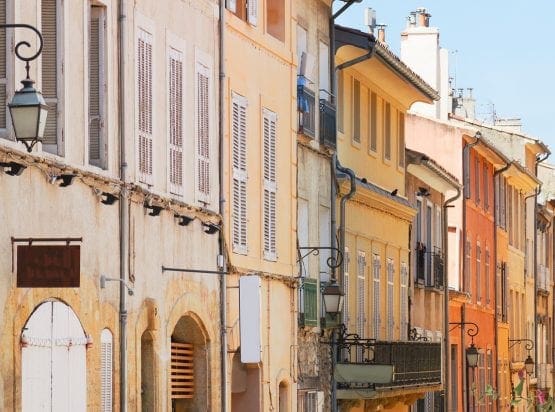
EXPLORE ALL OUR PROVENCE WINE REGIONS GUIDE
Last updated: April 4, 2025
There would be no argument if Cellar Tours had to single out one Provencal appellation that defies expectations. The beautiful and idyllic village of Cassis clusters around a delightful bay, with terracotta houses flanked by towering limestone-white cliffs over the Mediterranean Sea.
Yet it remains a closely guarded secret, unlike the overcrowded destinations of St-Tropez and Cannes. In these garrigue-covered hills, winegrowers produce remarkable flavors: a signature herby scent of lavender merged with the most intriguing tropical fruit, notes of garrigue, sunflowers, and honeysuckle.
Moreover, unlike the majority of appellations in Provence, Cassis’ local economy does not rely on the export of sun-kissed rosé. The production of white wines is its chief preoccupation, in addition to a small amount of red and, yes, a smattering of rosé styles. But make no mistake: Cassis is not obsessed with pink. Its charms lie elsewhere.
Discover More About French Wine
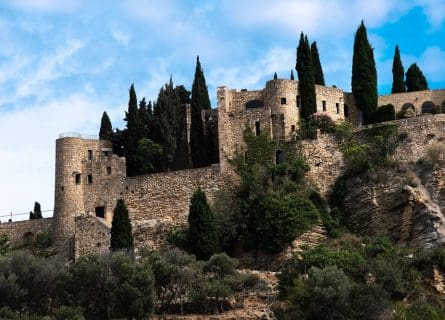
Cassis boasts a long and proud viticultural history, one of the oldest in France. Around 600 BC, Greek mariners founded Massilia (Marseille) and imported their culture and traditions, including wine.
Yet historians believe that people cultivated vines along this stretch of coastline long before the Greeks arrived. Nevertheless, the Romans established Provence’s first wine industry after Julius Caesar captured Massilia in 49 BC.
However, the Romans elected to maintain its status as a free port, and so Massilia grew wealthy from trade with Rome’s colonies across the Mediterranean. They called the wider region Provincia Romana, which evolved into the name Provence.
It was a glorious center of culture and commerce that survived for over four centuries until the Western Roman Empire began disintegrating in the 5th century.
Historians describe this period as the “Dark Ages” – a pithy and accurate description. Indeed, many bellicose tribes, including the Visigoths, Burgundians, and Ostrogoths, invaded Provence. In 711, the Muslim general Tariq led a force of Arab and Berber mercenaries into Andalucia (southern Spain). Within a few years, they controlled most of the Iberian Peninsula.
However, Tariq’s ambitions were limitless. In the 8th century, his armies crossed the border into Roussillon and soon conquered Provence. Yet the Franks launched an effective counterattack at key strategic positions, pushing the Moors back into Spain. In the early 10th century, Massilia enjoyed a revival spearheaded by the powerful counts of Provence.
From Obscurity to Recognition
Cassis, however, remained a backwater vineyard of little renown. Few outsiders, even in France, knew about the magic being coaxed out of Cassis’ terroir for centuries. Only in the 12th century did someone record a written account of winemaking in Cassis; by the 1700s, Cassis had staked its reputation on growing Muscat.
The grape, ubiquitous across Europe, was used to make a signature dessert wine style by raisening the grapes in sunlight to concentrate sugars in the must. Cassis thrived until the outbreak of the phylloxera epidemic in the latter half of the 19th century. The region’s entire viticultural landscape faced devastation – Cassis went out of business.
The Renaissance of Cassis Wine
Yet, phylloxera proved to be a catalyst for a remarkable – and, with hindsight, necessary – resurgence. After realizing American rootstock resisted the disease, winegrowers replanted vines across Cassis.
However, growers abandoned Muscat because it could not grow on the imported rootstock. This led growers to experiment with other Provencal varieties, such as Ugni Blanc, Marsanne, Clairette, and Sauvignon Blanc.
Over time, winegrowers planted several red varieties, including Syrah, Cinsault, and Grenache. But they form a tiny part of Cassis’ modern identity even today. In May 1936, authorities awarded appellation status to the region.
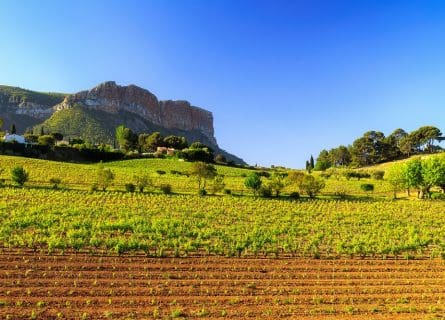
Situated 20km east of Marseille, Cassis continues to make a living from fishing, manageable levels of tourism, and viticulture. Flanked by the Mediterranean, its vineyards are sandwiched between Marseille and Toulon, planted on a series of low-lying hills and ridges that shimmer in the afternoon sunlight.
However, Cassis is not a homogeneous vineyard like all Provencal wine regions. Terroir varies considerably, with crucial differences in soil, aspect, and altitude all worthy of greater discussion – and perhaps, one day, a more rigorous hierarchical classification. The most significant moderators of the warm Mediterranean climate are the mountains that flank the village in all directions.
Geographical Moderators
Meanwhile, the Sainte-Victoire and Massif de la Sainte-Baume mountains to the north protect more exposed vineyards from occasionally strong winds, which can soften the worst excesses of barmy summer temperatures.
Similarly, the Chaine de Saint-Cyr and Canaille mountain ranges help shelter vines. Ideal vineyards are located on elevated cliff sides, north-facing, and protected by the aforementioned mountain ranges.
Higher altitude sites help moderate the severe summer heat and maintain acidity in the grapes. Calcareous soils offer the best of both worlds: good drainage and water retention capabilities.
Organic and biodynamic viticulture is becoming more popular as growers reject synthetic inputs for more eco-friendly vineyard solutions and pest-control methods. All in all, this is an exceptional terroir for the production of high-quality wines.
Cassis is a region of small family concerns rather than large corporations and massive volumes. As a result, you’re unlikely to visit state-of-the-art wineries and chic tasting rooms; tourism in Cassis is defined by the authenticity of a family welcome and real insight into the ancient traditions of this proud region.
Yet very few poor wines are being made today, as owners have invested in better equipment and viticultural practices to safeguard their reputation in a fiercely competitive global market. Today, the region overwhelmingly commits to producing saline dry whites.
Diversity and Excellence
Styles and local expressions vary dramatically: you can enjoy a racy Sauvignon Blanc blend one minute and then a rounded, generous wine the next, based on Marsanne and Clairette. In general terms, winemakers always tend to preserve freshness in the wines, handling the grapes must carefully and using cooler fermentation temperatures to protect the fruit.
Meanwhile, the small volume of red wines resemble southern Rhone in their heady perfume and ripe fruit. Grenache and Mourvedre blends are the most exciting reds being made here – perfect with Camargue lamb.
In 2023, no other part of France has such a high concentration of quality-focused estates in a relatively small area. The best of Cassis’s winemaking is exquisite and more than merits a trip to Provence.
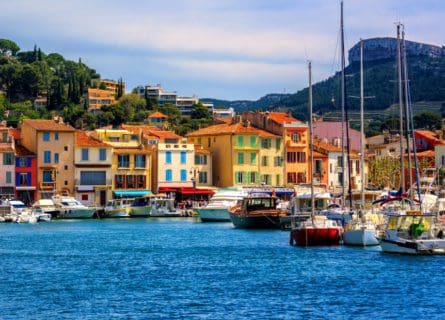
Proponents of Cassis – thankfully growing in number – will tell you that the region’s white wines have few rivals in Provence. They’re not wrong: expect a combination of fresh tropical and citrus fruit, garrigue, herby scents, a suggestion of honey, and, above all, a vigor and racy acidity. Even less exalted producers approach the connoisseur’s ideal. The wines are also incredibly food-friendly, with a style for every occasion and palate. Very young, crisp, and fruity Cassis often serves as an aperitif – a function it performs admirably.
Value and Appeal
But as the wines become weightier and more complex, you can think about pairing them with grilled fish, langoustines, salade niçoise, and roast chicken with herbs.
Moreover, even the top labels are seldom expensive, as supply and demand remain balanced. This is not a region driven by price speculation: the world’s trophy hunters have no real interest in Cassis—which is all the better for us.
A Growing Influence
Yet Cassis continues to seduce influential sommeliers and buyers in the 21st century. This is partly due to local tourism increasing (within sustainable levels) and partly because key stakeholders are more interested in sending their wines abroad.
The timing is very opportune as the esoteric has never been more fashionable in hipster circles; a movement away from homogenized wine styles began in earnest in the early 2000s, spearheaded by bloggers. It was based on the premise that a region’s unique cultural identity should be celebrated rather than ‘smothered’ by ubiquitous grape varieties. Granted, you will find a decent smattering of Sauvignon Blanc in Cassis.
For the most part, however, this is a showcase for original flavors, indigenous grapes, and longstanding traditions. Good Sauvignon—and indeed rosé—can be made worldwide, but there is only one Cassis.
Bourboulenc is a white wine grape variety grown mainly in Southern Rhône, Provence, and Languedoc in southern France.
Find out moreSavor Clairette blanche, a captivating white wine grape from France's Chateauneuf-du-Pape, Provence, Rhône, and Languedoc vineyards
Find out moreUncover the allure of Marsanne grape variety. From its traditional role in Rhône blends to the new wave of single-varietal Marsanne wines.
Find out morePascal Blanc is a rare, disease-sensitive white grape used in Cassis AOC wines, where it can make up to 40% of the blend. It thrives in Cassis' warm, dry climate and adds citrus, herb, and nutty flavors to the region's light, dry wines.
The sauvignon blanc grape varietal, originally from the Bordeaux region of France, is now one of the world's most loved white varieties.
Find out moreTerret Blanc is an old, high-yielding grape variety from southern France, once popular for Vermouth and dry whites. Its use has declined, but it's still permitted in certain French AOCs, contributing 10-30% to white wine blends. The grape produces light, crisp wines and is mostly confined to southern France.
Experience Trebbiano Toscano's Renaissance: Aromatic & Fresh Bianco Toscana IGT from Petrolo. The Future of Italian White Wine
Find out moreCinsault is a red wine grape that is important in the Languedoc-Roussillon wine region of France because of its tolerance to high temperatures.
Find out moreDiscover grenache, a mediterranean grape that is dark-skinned red wine grape variety and an unlikely hero of a grape
Find out moreMourvèdre is a red wine grape variety of mysterious origin that's grown around the world, including the Rhone and Provence regions of France.
Find out moreLike all Provencal towns, Cassis boasts a good selection of restaurants and bistros run by chefs who place a high premium on seasonality and traditional recipes. However, your options increase dramatically once you arrive in nearby Marseille, where years of immigration have created one of Provence’s most exciting – and diverse – food scenes. The charming Vieux Port overflows with French, Indian, Moroccan, Tunisian, and Italian restaurants – take your pick.
A Gastronomy Guide of Provence: Read more

Uncover Aix-en-Provence's vibrant flavors and culinary gems with our expert guides. Plan an unforgettable trip now!
Read more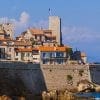
Uncover Antibes' vibrant flavors and culinary gems with our expert guides. Plan an unforgettable trip now!
Read more
Uncover Avignon's vibrant flavors and culinary gems with our expert guides. Plan an unforgettable trip now!
Read more
Uncover Marseille's vibrant flavors and culinary gems with our expert guides. Plan an unforgettable trip now!
Read more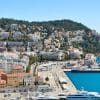
Uncover NIce's vibrant flavors and culinary gems with our expert guides. Plan an unforgettable trip now!
Read more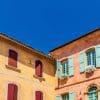
Uncover Orange's vibrant flavors and culinary gems with our expert guides. Plan an unforgettable trip now!
Read moreIf you would like us to customize an exclusive luxury tour, contact us and let us know your travel plans. We offer luxury food and wine tours for private groups of a minimum two guests. In addition, all of our private, chauffeured tours are available year-round upon request.

